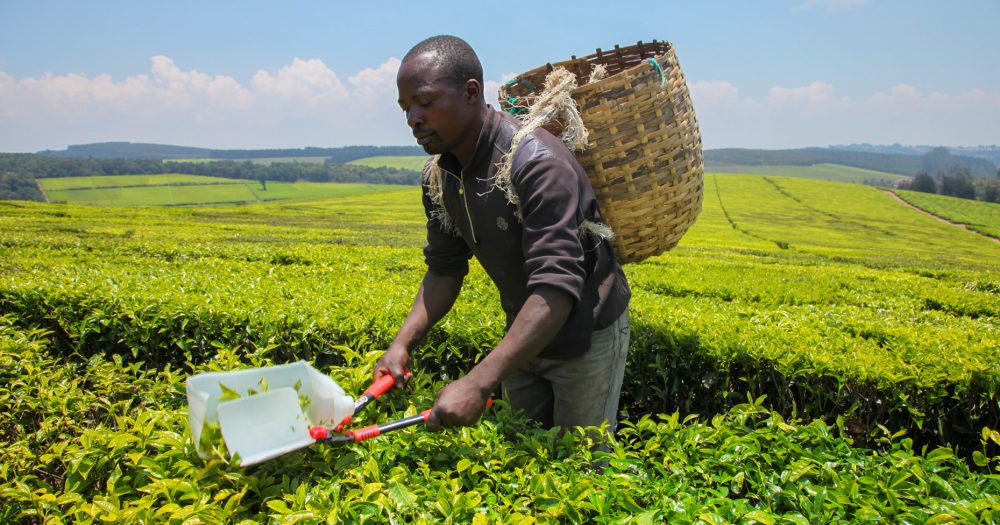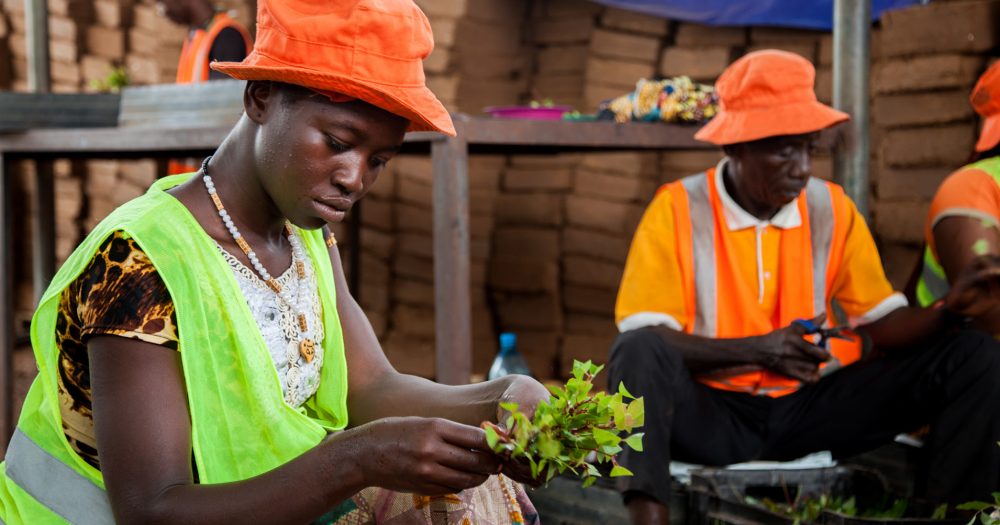This investment was made when British International Investment was named CDC Group.
Our investment
Description of the investment.
Description of the investment.
We committed to a risk participation agreement with Absa to increase the availability of trade finance in Africa. During the COVID-19 pandemic we increased our commitment to provide additional counter-cyclical support.
The risk-sharing agreement allows Absa to increase its limits to local banks, which has the potential to increase the volume of short-term trade credit by up to $360 million per annum. Again, this will allow domestic banks in Africa to support trading businesses in importing commodities, goods and equipment and ultimately support economic opportunities and access to goods for people.
Impact information
Applies to investments made from 2019 onwards. The tabs in this section define what we expect to achieve through the investment, assessing the potential impact of the investment against six dimensions of impact. You can find more details on our methodology of assessing impact here.
Applies to investments made from 2019 onwards. The tabs in this section define what we expect to achieve through the investment, assessing the potential impact of the investment against six dimensions of impact. You can find more details on our methodology of assessing impact here.
What?
| Impact |
|---|
|
|
|
How?
| How? |
|---|
|
Economic enabler: CDC has provided a risk-share arrangement so that Absa can extend more foreign currency trade credit to regional and domestic banks and sustain higher trade volumes than the bank can support without CDC's support. This will enable businesses to import the commodities and equipment they need to sustain business operations, market output and contribution to GDP, ultimately leading to job/livelihood retention and the continued or increased availability of goods in the market. |
Who?
| Stakeholder | Geography | Characteristics |
|---|---|---|
| Employees, consumers |
Pan-African. By December 2020, the trade risk sharing facility had supported trade flows in the following countries: Ghana (category C country), Nigeria (category B country), Kenya (category C country), Malawi (category A country), Madagascar (category A country) and Zimbabwe (category A country). |
Given the variance of industries in which the businesses operate, for characteristics of people who ultimately benefit from the enabled trades, we assume mass market characteristics and demographics of the respective geographies. |
How much?
| Scale | Depth/Duration |
|---|---|
|
Based on assumptions related to average tenor and utilisation, we anticipate that the $150 million trade risk sharing facility will enable up to $360 million in additional trade volumes per year. |
In October 2020, the World Bank adjusted its real GDP growth projection for Africa to -3.3 per cent in 2020, after expanding by 2.4 per cent in 2019. As a result, impact is expected to be deeper in a context where circumstances have worsened as a result of COVID-19, i.e. increasing unemployment and lower access to goods/services. Countries with smaller and less developed domestic capital markets continue to feel the effects of COVID-19 more acutely than more developed markets. |
Contribution/additionality
| Contribution/additionality |
|---|
|
Grid score
| Grid Score
To help us direct our investments, we previously used a tool called the Development Impact Grid. It scored investments out of four, based on two factors: the difficulty of investing in a country and the propensity of the sector to generate employment. This tool was used for investments until the end of 2021. Since 2022 it has been replaced by the Impact Score. |
|---|
2.85Market context: the global trade finance gap is estimated to be $1.5 trillion, and the average unmet demand in Africa represents 5.5 per cent or $91 billion |
Risk
Evidence RiskVisibility on the impact on ultimate borrowers depends on Absa and the local banks’ ability to provide data on underlying borrowers. Absa provides data on underlying trades financed through the facility, including information on country, sector and a description of goods. We mostly rely on theory, evidence and macro trade data to understand the indirect impact of trade on capital markets, economies and people. External RiskThere may be a risk that there is not enough demand and/or that other constraints are hindering the impact to occur, e.g. logistical, economic, policy. |
Environmental and social information
-
Environmental and social summary
A high-level description of the environmental and social aspects of the investment. This may include a summary of key environmental and social risks identified during environmental and social due diligence (ESDD); key elements of an environmental and social action plan (ESAP); or ways in which we plan to support the investee improve environmental and social standards, such as through their environmental and social management system (ESMS); as well as any other priority areas agreed with the investee.
-
Environmental and social risk
A risk category rating, which indicates the level of environmental and social risk associated with an investment. For an explanation of the categorisations used, see here. We consistently provide an environmental and social risk category for all investments screened from 2023 onwards.
Environmental and social summary
ABSA will ensure that the exports or imports do not involve any excluded activities including fossil fuel activities, and comply with BII's safeguarding requirements.
Reporting and Complaints Mechanism
The Reporting and Complaints Mechanism allows anyone outside BII to report alleged breaches of the business integrity or environmental and social provisions of BII’s Policy on Responsible Investing. This includes breaches made by BII, a BII investee, or a portfolio company of a fund in which BII has invested. The Reporting and Complaints Mechanism Rules are available here. Reports and complaints can be submitted by email to reportsandcomplaints@bii.co.uk or by mail. See more details on our Reporting and Complaints Mechanism here.
For any other general enquiries contact us at enquiries@bii.co.uk
-
Key facts
- Last updated
:
When the last quarterly update of the website database occurred.
- June 2024
- Project number
:
An identifier number shared by investments in the same project.
- D3558
- Status
:
The current status of the investment (green flag for active and red flag for exited).
- Active
- Region
:
The geographical region where the country is located. We currently invest in Africa, South Asia, South East Asia and the Caribbean. In 2023, BII’s investment mandate was extended allowing it to invest in regional funds linked to Ukraine, with the majority of activity expected to begin post-war. Investments outside these regions were made prior to 2012 under previous investment mandates.
- Southern Africa
- Country
:
The countries where the investment delivers impact. Where impact is delivered in multiple countries, this is indicated.
- South Africa
- Sector
:
We prioritise those sectors that facilitate development and need our capital the most. Our priority sectors contribute towards many of the Sustainable Development Goals. They range from investing in the power infrastructure that will provide people with better access to electricity, to investing in financial institutions that direct capital to the individuals and businesses that need it the most.
- Financial services
- Investment type :
- Guarantee
- Start date :
- July 2020
- Amount :
- $75m
- Currency of investment :
- USD
- Domicile
:
The company or investment fund’s place of incorporation.
- South Africa
We provide capital in the following ways: directly – through direct equity, direct debt, guarantees and other non-intermediated financial instruments; and indirectly – principally through investment funds.
For direct investments and fund investments, this is the date BII committed capital to the investments. This is typically the date on which legal agreements are signed by all parties.
For the portfolio companies of our fund investments, this is the date (either the month or the quarter) on which the fund committed capital to the portfolio company.
For direct equity investments, this is the date at which British International Investment exited the investment.
For debt investments, this is the date at which the final debt repayment was made.
For funds, this is the date at which the fund was terminated.
For underlying fund investments, this is the date at which the fund manager exited the investment.
The total amount committed, per financial instrument, per investment, on the date BII becomes subject to a binding legal obligation to provide funding or assume a contingent liability. This information is provided in US dollars.
For direct investments, this is the amount that BII has committed to the business or project. For fund investments, this is the amount BII has committed to the fund.
The currency in which the investment was made.
- Last updated
Related investments made by BII into this company:
| Investment name | Commitment | Region | Sector | Start date | Status |
|---|---|---|---|---|---|
| Investment 01 | $75m | Southern Africa | Financial services | October 2019 | Active |
| Investment 02 | $100m | Southern AfricaSouthern Africa | Financial services | December 2019 | Exited |
| Investment 04 | $50m | Southern AfricaSouthern AfricaSouthern Africa | Financial services | August 2020 | Exited |
| Investment 05 | $25m | Southern AfricaSouthern AfricaSouthern AfricaSouthern Africa | Financial services | June 2021 | Active |
| Investment 06 | $150m | Southern AfricaSouthern AfricaSouthern AfricaSouthern AfricaSouthern Africa | Financial services | June 2021 | Exited |
| Investment 07 | $150m | Southern AfricaSouthern AfricaSouthern AfricaSouthern AfricaSouthern AfricaSouthern Africa | Financial services | July 2023 | Active |
| Investment 08 | $-75m | Southern AfricaSouthern AfricaSouthern AfricaSouthern AfricaSouthern AfricaSouthern AfricaSouthern Africa | Financial services | August 2023 | Active |


